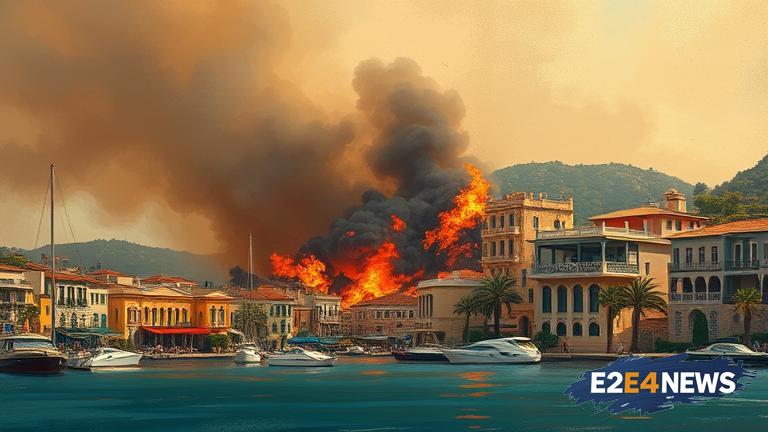A devastating wildfire has swept through the Limassol district in Cyprus, leaving a trail of destruction and raising questions about the country’s ability to prevent and respond to natural disasters. The fire, which began on July 27, 2025, has burned thousands of acres of land, forcing evacuations and destroying homes and businesses. The cause of the fire is still unknown, but officials suspect it may have been sparked by a combination of strong winds and high temperatures. The Cyprus government has declared a state of emergency and deployed military personnel to assist with firefighting efforts. The European Union has also offered support, with firefighters and equipment arriving from neighboring countries. Despite the efforts, the fire has proven difficult to contain, with flames jumping containment lines and spreading to new areas. The disaster has highlighted the need for improved forest management and fire prevention strategies in Cyprus. The country’s rugged terrain and strong winds make it prone to wildfires, and officials have warned that the risk of fires will only increase due to climate change. The Limassol wildfire is the latest in a series of devastating fires to affect the region, with similar disasters occurring in recent years in Greece and Turkey. The economic impact of the fire is expected to be significant, with damage to agriculture, tourism, and infrastructure. The fire has also raised concerns about the environmental impact, with fears that the blaze could damage sensitive ecosystems and wildlife habitats. The Cyprus government has pledged to conduct a full investigation into the cause of the fire and to implement measures to prevent similar disasters in the future. The international community has offered support and assistance, with donations and aid pouring in from around the world. The people of Cyprus are coming together to support those affected by the fire, with fundraising campaigns and volunteer efforts underway. The fire has also sparked a debate about the role of climate change in exacerbating natural disasters, with many calling for increased action to reduce carbon emissions and mitigate the effects of global warming. As the situation continues to unfold, the people of Cyprus remain resilient and determined to rebuild and recover from this devastating disaster. The Limassol wildfire serves as a stark reminder of the importance of disaster preparedness and the need for collective action to address the challenges posed by climate change. In the coming weeks and months, the focus will shift from response to recovery, with efforts to restore damaged areas and support those affected by the fire. The Cyprus government will face scrutiny over its handling of the disaster, with many questioning whether enough was done to prevent the fire and respond to its aftermath. As the investigation into the cause of the fire continues, officials will be under pressure to provide answers and to implement measures to prevent similar disasters in the future. The international community will continue to play a critical role in supporting the people of Cyprus, with aid and assistance expected to continue in the coming weeks and months. The Limassol wildfire will have a lasting impact on the country, with many calling for increased investment in disaster prevention and response measures. The disaster serves as a wake-up call for the importance of addressing climate change and mitigating its effects on communities around the world.
